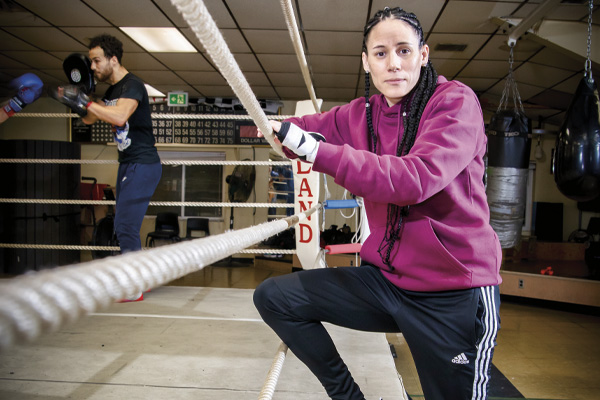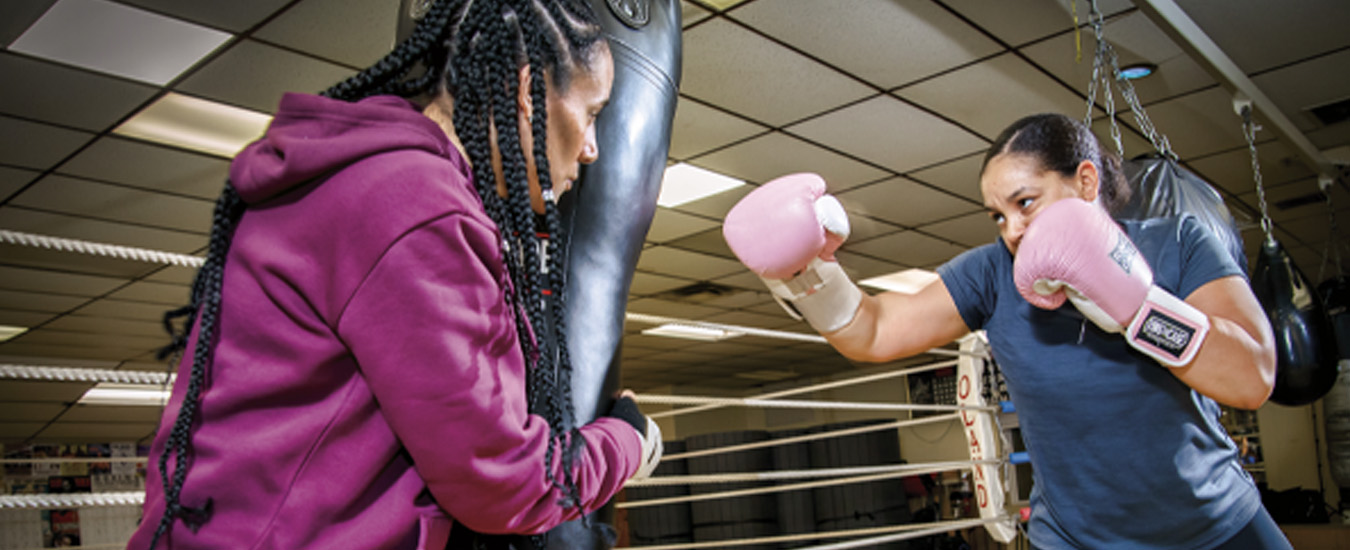Jim Maloney and Bridget Stevens partnered to help Indigenous youth at their Tribal Boxing Club
Some may have considered them an odd couple. No longer.
He was a Nova Scotia aboriginal youth who left Indian Brook First Nation (Sipekne’katih) reserve at Shubenacadie for New England in 1963 and eventually became New England state champion in full contact karate.
She was a young girl from the Eskasoni Reserve in Cape Breton who was into gas sniffing and alcohol with little hope for the future.
Their story is not unfamiliar to many aboriginal youths struggling to establish an identity in a society that has not been accepting.
At 16, unwilling to remain in the impoverished surroundings where he grew up with eight siblings and with an ambition to break away, Jim Maloney hitchhiked to Boston. After some menial jobs, he began training in martial arts and in time achieved his goal of becoming state champion. But his marriage to Anna Mae Acquash from Indian Brook broke up. In Boston, Anna Mae became involved with the American Indian Movement and was eventually killed at Wounded Knee, on the Pine Ridge Reservation in South Dakota. After nine years in Boston, Jim moved back to Indian Brook with his two daughters.
Over the years he opened karate schools in the Metro area, became a boxing promoter and trained students in martial arts. Today he operates a security firm, among other business interests.
In 2000 Jim and Bridget Stevens met and over time forged a relationship that is bringing hope to many young people in the region’s aboriginal communities and beyond; youth who are interested in improving their lives through sports, in particular the sport of boxing.
Formerly described as the manly art of self-defence or the sweet science, boxing has changed the lives of many deprived youths around the world. In Atlantic Canada, boxing led most other sports in popularity for much of the last century and many world-calibre fighters came from here.
Today, Bridget is head coach and trainer at her Tribal Boxing Club in Dartmouth, just up the street from a small gym where she began her journey to sobriety and a promising future. Jim and Bridget married in 2009 on Valentine’s Day. Their first meeting was unexpected.
Jim was in Eskasoni directing a fisheries program and doing some self-defence training for youths in the community. Bridget stood out as someone needing help and who was anxious to learn.
He decided that perhaps boxing would bring her stability, and self-respect and help rescue her from a life that appeared to be hopeless.

“No drinking,” was his only admonition to the young woman when he promised to train her after watching her first efforts in the ring. She admits she slipped a few times, but her parents warned her against throwing away a promising future with Jim.
Impressed with Bridget’s energy and eagerness to learn but aware she lacked any resources of her own, Jim surprised her one day with some expensive gym clothes. The gift appeared to ignite in her an even greater effort to train.
“I was so excited,” she recalled when she was featured in a video I produced in 2007 about the achievements of aboriginal youths in Nova Scotia. “The cost of the clothes was more than my welfare. I told myself I’m going to train my heart out. I had had no hope, my life was over.”
As her training progressed, Jim brought in the late Tom McClusky, one of Nova Scotia’s most respected boxing trainers. Tom also saw promise in his young charge and coached her as she boxed as an amateur locally. After nine bouts she was a leading contender in women’s amateur ranks in Canada.
Then she suffered a broken jaw, sparring in the gym with a taller, heavier fighter. Her dreams of a possible Olympic challenge and perhaps a world championship were shattered.
The catastrophic injury caused her mental anguish and set her on a new path, one that she had never considered.
On a recent day with the gym full of aspiring young boxers and just casual fitness buffs whom she now considers her family, Stevens, masked and with her hands wrapped, moved around the large second-floor gym, its walls plastered with pictures of past world champions, teaching them the rudiments of the sport. Whether shadow boxing in the ring or pounding heavy bags, they follow her instructions as she directs their training and keeps time. It’s the third gym they have used over the years after Bridget began boxing, and they jokingly refer to it as “tribal three.”
The first was a Dartmouth gym where they were barred because women were not permitted to train, until one day Jim and Bridget brought in McClusky. His reputation made the difference.
“Then the doors magically opened,” recalls Maloney.
Aware that some are unable to pay, Bridget provides free classes for those under the age of eighteen and buys some of the necessary equipment like gloves, headgear, ropes for skipping and punching bags.
As we sat in her office, she recalled growing up in Eskasoni where peer pressure and violence drove her to alcohol and sniffing gas with other youths to calm her anxieties. Then she took to cutting herself to relieve the pain in her head.
“Boxing, the hard work was my fix,” she says now, reflecting on her journey to sobriety and a positive future.
Jim insists that although he supported her plans unconditionally, it is now Bridget who runs the gymnasium and sets the rules. Both share in the maintenance of the facility.
The club, which has a membership of 50 to 60 male and female participants, has had a number of successes, including sending five boxers to the Canadian National Boxing Championships in 2019, where they won two gold medals, silver and a bronze.
Bridget and Jim also trained Nathan “Timber Wolf” Millier from the Elsipogtog Reserve in New Brunswick, who won the Canadian middleweight championship in Moncton in 2017.
Natteal Battiste, of African-Aboriginal heritage found sanctuary in her relationship with Bridget and the Tribal gym, and boxing has been a life altering experience.
Born in Boston and growing up on the Acadia First Nation reserve near Yarmouth, the violence and suicides there affected her to the point where she “hibernated at home” for long periods of time, and finally sought relief from her despair at a local boxing gym.
That began attendance at a number of gyms until she landed at the Tribal gym in Dartmouth. She was brought to Bridget by her terminally-ill grandmother Evelyn Francis in 2014 with the request that she and Jim look after her. Evelyn had been best friends with Jim’s first wife Anna Mae in Boston.
“Boxing has motivated me to be grounded and has taken care of all my anxieties, like PTSD. It’s you versus you in boxing.”
She did some competitive boxing, but as a left hander or southpaw, didn’t find many willing to compete with her difficult style.
A graduate of Saint Mary’s University majoring in psychology, she worked as financial advisor with RBC and is now youth care councillor for Mi’kmaw Family and Children’s Services, something she says is “near and dear to my heart.”
Natteal has lived off reserve for the last 10 years, but says that COVID-19 made her realize that she should run for office to help the band where possible.
She was elected councillor at Acadia First Nation in Yarmouth last year and now lives in Dartmouth with her partner and daughter Nevelyn. As the band’s youngest councillor she hopes to bring another perspective to its deliberations.
Her life is now centred on the Mi’kmaq seventh generation principle, she says, based on an ancient Iroquois philosophy that the decisions made today should result in a sustainable world seven generations into the future.
Correction: Due to a fact-checking error, the print edition of this story incorrectly described Jim Maloney as "Canada’s only karate Grand Master." As readers have noted, Canada boasts a number of other 10th degree black belts, and the term "Grand Master" generally isn't used in Japanese martial arts. The text above has been corrected.
